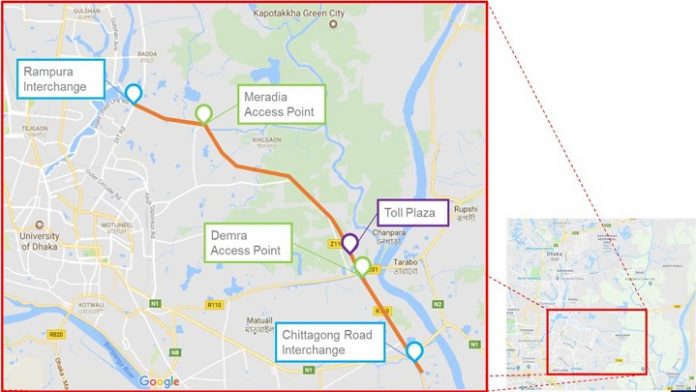The government has initiated to upgrade Rampura-Amulia-Demra (RAD) road into an expressway around six years ago to reduce traffic congestion in Dhaka, but it is being delayed because of inefficiencies in dealing with the bid awarding process.
Appointing a contractor out of three has been halted for two years as the Roads and Highways Department (RHD) has submitted faulty documents repeatedly to the Cabinet Committee on Economic Affairs (CCEA). Therefore, approving a company is still unsettled.
Such a delay will so far push up spending, decrease the rate of economic benefit of the project as well as negatively impact the foreign investors as it is a Public Private Partnership (PPP) initiative while Chinese investors are involved.
According to the project documents, The RAD Expressway is a 13.5km four-lane controlled access toll highway, including 9.4km elevated sections, from Rampura point of Hatirjheel to the junction with the National Highway N1 (Chittagong Road) and National Highway N2 (Sylhet Road).
Some 30,000 traffic has been projected on the expressway in 2025. But the road users mostly towards Chittagong and Sylhet from Dhaka are missing the benefit as construction work still has not been started despite being initiated in 2015.
However, the Md. Abdus Sabur, top brass of the RHD told Desh Shamachar that “there is no negligence for delaying to complete the ground work. It is very common in Bangladesh due to various reasons.”
Meanwhile, prominent transport expert Prof Shamshul Haque opined that RAD is a PPP project while foreign investors are involved. Any prolong devaluation process lacking transparency and fairness may undermine foreign investors’ confidence in the Bangladesh market. “Apart from this, the project will be delayed due to inefficiencies is not logical,” he told Desh Shamachar.
What is delaying the evaluation process?
On 01 July 2019, four short listed companies submit their proposals (Request for Proposal-RFP) to the technical evaluation committee, formed by the RHD to contract the expressway. The committee considered financial proposals from three technically-responsive Chinese companies and proposed CCCCL-CRBC as the preferred bidder based on readout figures instead of as-evaluated figures, despite the company wasn’t lowest bidder.
Then, a review panel formed by PPP Authority sorted out some inconsistencies and they recommended fixing the problem. The panel directed the RHD to compare all three bids on common basis and accepted CRCCIG-CCECC-MAX JV’s semi-annual base availability payment. Further, the panel recognized CRCCIG-CCECC-MAX JV as a lowest bidder unless the Contracting Authority can confirm in writing that CCCCL-CRBC’s proposal is inclusive of VAT and AIT.
Without following the review panel’s opinion in regard to the tax inclusion confirmation, the RHD selected CCCCL-CRBC as contractor of the project in March 2020 and sent a proposal to the Cabinet Committee on Economic Affairs (CCEA)for final approval. However, the CCEA didn’t accept the proposal and has returned to RHD on 10 December 2020.
The RHD wrote to CCCCL-CRBC for confirming VAT and AIT inclusion on 28 December 2020, and received a confusing reply in which they confirmed they incorporated tax for payments between Project Company and their Service Providers/Suppliers/Contractors during Construction phase and the ambiguity of tax inclusion payable by the Government of Bangladesh to the Project Company during Operation Phase remains unclear. CCCCL-CRBC’s confirmation didn’t fully comply with the decision of the Review Panel and CCCCL-CRBC still didn’t confirm if they have included AIT and VAT payable to the government. The proposal of CCCCL-CRBC was submitted to CCEA and was sent back again on 27 January 2021.
CCEA further sought clarification from PPP Authority, regulatory body of PPP Projects and was convinced that there was no scope for CCCCL-CRBC to incorporate tax between Project Company and the RHD in their financial proposal, CRCCIG-CCECC-MAX was therefore the lowest bidder.
The Ministry of Law also supported PPP Authority’s observation and decision when RHD sought a legal clearance from the ministry.
Having learnt of the legal opinions from the Ministry of Law, CCCCL-CRBC filed a writ petition against the Government of Bangladesh in the High Court. The High Court directed the RHD to conclude the process in light of the decision of Review Panel and following Procurement Guidelines for PPP Projects, 2018. The decision of the RHD and the Ministry of Transportation is pending.
“The technical committee concluded its evaluation very quickly (within two weeks) as they were so far biased to prefer CCCCL-CRBC instead of selecting the lowest bidder,” said a RHD official anonymously.
“The revised proposal is clear and transparent which is now pending for approval. Once the cabinet committee approves, we will sign a deal with the awarded company,” said A.K. Mohammad Fazlul Karim, additional chief engineer of RHD. However, he denied any irregularities or biases regarding the whole process.
Land acquisition also delayed
The government is set to spend Tk1,209. 6 crore in a bid to complete necessary land acquisition and rehabilitation works which was approved by ECNEC January 20, 2020.
However, land acquisition is being delayed as HRD still has not completed all the procedures regarding land acquisition and rehabilitation.
Nur-e-Alam, Supperentant engineer of RHD said ‘we have already sent a proposal to the deputy commissioners for acquiring land. Hopefully, it will start soon.
How will the expressway be operated?
As per the PPP proposal of the Project, the selected Chinese (private partner) contractor will provide post-construction operation and maintenance services for 21 years. The RHD will pay toll money to the private partner to recover its investment into the Project. RHD can be collected as four toll plazas to be installed into the expressway at Chittagong Road Junction, Demra Staff Quarters, Meradia and Rampura Bridge.
According to the feasibility study, the private partner has to spend Tk2,094.01 crore to construct the project.




